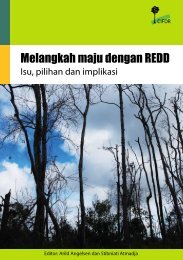Adaptive collaborative management of community forests in Asia ...
Adaptive collaborative management of community forests in Asia ...
Adaptive collaborative management of community forests in Asia ...
Create successful ePaper yourself
Turn your PDF publications into a flip-book with our unique Google optimized e-Paper software.
Chapter 5: Muddl<strong>in</strong>g Towards Cooperation <strong>in</strong> Mal<strong>in</strong>au • 149<br />
Learn<strong>in</strong>g with<strong>in</strong> the facilitation team<br />
Creat<strong>in</strong>g this adaptive facilitation required an <strong>in</strong>itial large <strong>in</strong>vestment <strong>in</strong><br />
team build<strong>in</strong>g and communication skills dur<strong>in</strong>g the first year, with ongo<strong>in</strong>g<br />
efforts at a lower level <strong>of</strong> <strong>in</strong>tensity. Our team size and composition shifted<br />
with each phase, but the cont<strong>in</strong>uity <strong>of</strong> a core team <strong>of</strong> five people ensured that<br />
our own learn<strong>in</strong>g was cumulative 13 . The team’s deep and rich knowledge <strong>of</strong><br />
Mal<strong>in</strong>au over the years provided the foundation for judg<strong>in</strong>g when to adjust<br />
our strategy and how.<br />
In the beg<strong>in</strong>n<strong>in</strong>g, our team was very focused on creat<strong>in</strong>g structures that<br />
allowed reflection. Over time, the team developed its own organisational<br />
culture and rhythm <strong>in</strong> which reflection and feedback became automatic. We<br />
had daily sessions dur<strong>in</strong>g events such as the <strong>in</strong>ter<strong>community</strong> workshops, and<br />
we met at about three-month <strong>in</strong>tervals for plann<strong>in</strong>g. Villagers sometimes<br />
participated directly <strong>in</strong> the sessions, and we <strong>of</strong>ten solicited feedback from<br />
external observers or villagers to <strong>in</strong>form our reflections. Our usual plann<strong>in</strong>g<br />
horizon was three to six months. The <strong>in</strong>itiation <strong>of</strong> a new cycle <strong>of</strong> activity<br />
emerged naturally dur<strong>in</strong>g the plann<strong>in</strong>g sessions, <strong>in</strong> which we reviewed the<br />
effectiveness <strong>of</strong> previous plans based on the results from the monitor<strong>in</strong>g and<br />
other activities. We built risky or uncerta<strong>in</strong> activities 14 <strong>in</strong>to our plans with<br />
the understand<strong>in</strong>g that we would learn by do<strong>in</strong>g and be flexible enough to<br />
make midcourse adjustments.<br />
Ironically, however, as the process became more automatic, we tended to<br />
make fewer structured opportunities for it to happen. The learn<strong>in</strong>g process<br />
also tended to become a low priority <strong>in</strong> the rush <strong>of</strong> events. We suggest that<br />
ma<strong>in</strong>ta<strong>in</strong><strong>in</strong>g a structured, explicit approach to learn<strong>in</strong>g even after it becomes<br />
well accepted will help ensure that it is not neglected. The challenge is to<br />
f<strong>in</strong>d fresh approaches to reflection to avoid mak<strong>in</strong>g the learn<strong>in</strong>g process too<br />
time-consum<strong>in</strong>g, tedious or bor<strong>in</strong>g.<br />
Results <strong>of</strong> our learn<strong>in</strong>g<br />
Each cycle <strong>of</strong> activity evolved <strong>in</strong> the context <strong>of</strong> work that preceded it and<br />
reflected our own deeper understand<strong>in</strong>g, commitment and embeddedness<br />
<strong>in</strong> Mal<strong>in</strong>au. Our understand<strong>in</strong>g <strong>of</strong> spontaneous orders for cooperation,<br />
on the other hand, emerged from what we referred to as the ‘theory <strong>of</strong><br />
co<strong>in</strong>cidence’ and has become clear to us only <strong>in</strong> recent years.
















